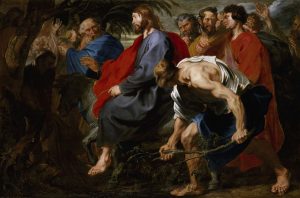Thoughts on Sunday’s Lessons for April 5, 2020
Liturgy of the Palms A
Gospel: Matthew 21:1-11
Palm Sunday and Passion Sunday were long celebrated separately on the two Sundays before Easter, but in modern times they are combined on the Sunday that begins Holy Week.

Entry of Christ into Jerusalem (1617), oil painting by Anthony van Dyck (1599-1641). Indianapolis Museum of Art. (Click image to enlarge.)
This creates a jarring experience as we begin the liturgy with Jerusalem’s crowds celebrating the arrival of Jesus as Messiah and King in the Gospel of the Palms; and then, later in the same service, we hear them shouting “crucify him!” in the Gospel of the Passion. In the Gospel of the Psalms, Matthew tells of Jesus’s triumphal procession into the city riding two animals at once, an odd image based on Zechariah’s prophecy that Israel’s shepherd-king would come “mounted on a donkey, and on a colt.” Soon Jesus will anger the authorities again when he drives the money-changers out of the temple, as the Gospel narrative leads inexorably to his passion and death on the cross.
Psalm: Psalm 118:1-2, 19-29
We often sing this Psalm as we process into church on Palm Sunday, waving our palm leaves. This ancient hymn depicts another festive procession in honor of a righteous and merciful Lord and God. In familiar words we celebrate “the day that the Lord has made.” As we think of Jesus as Messiah, we remember the stone the builders rejected that became the cornerstone.
Liturgy of the Passion A
First Reading: Isaiah 50:4-9a
When Christians hear Isaiah’s verses about the suffering servant, our thoughts naturally turn to Jesus Christ, our messiah and king. In our Creeds, we profess that Jesus was crucified for our sake, suffered death and was buried. Our Gospels reveal a Jesus who taught us to turn our cheeks to those who strike us, knowing that a peaceful response to enemies is no cause for disgrace. We must never forget, though, that Isaiah was not writing for Christians in the future time but to a Jewish audience in his own time. He prophesied to a people living in exile in Babylon, a suffering body of faithful servants, all hoping and praying for a Messiah and King to lead them home.
Psalm: Psalm 31:9-16
Perhaps the Psalmist who wrote these ancient verses of sorrow and lamentation had Isaiah’s Suffering Servant in mind. We also might think of Job’s suffering as we chant this litany of sorrow, distress, grief, sighing, misery, scorn, horror, dread and more. While we suffer, the Psalmist sings, our neighbors scheme; they even plot our death. But the tone changes from sorrow to hope as the Psalm continues. With faith in God, hope still glows for us like the sun breaking through clouds: We trust in God’s love. We wait to be saved.
Second Reading: Philippians 2:5-11
Paul sets out these poetic verses from an early Christian hymn, an ancient confession in song that preceded the Nicene and Apostles Creed by three centuries. They declare that Christ was fully divine, yet fully human too, and willing to set aside his divinity – “emptying himself” – to bear the horrific pain of crucifixion as a vulnerable, frightened human. Jesus took on the full weight of all that suffering to show us the true exaltation of God’s love, calling us only to respond with love for God and our neighbor.
Gospel: Matthew 26:14 – 27:66
Finally Sunday’s readings reach their conclusion as we hear Matthew’s long narrative of Jesus’ passion and death. We listen through Christ’s long journey from the Last Supper to the crucifixion. There is much packed into these two chapters from Matthew, from Judas’ betrayal through the institution of the Eucharist; Jesus suffering in the garden, his arrest and trial, his journey to the cross and his death and burial. That’s a lot to grapple with all at once, so let’s reflect on one passage: When Jesus told the apostles during the Last Supper that one of them would betray him, every one of them was afraid. Every one, no matter how much he loved Jesus, wondered if he might be the traitor. Each in turn asked, ‘Surely not I, Lord?” As are we, they are human, frail and weak. And Jesus, loving us still, takes up the cross.
(As an abbreviated alternative, this Gospel may be shortened to include only verses 27:11-54. This passage recalls the events from the arrest of Jesus to his death on the cross. It ends with a foreshadowing of the resurrection with the opening of the tombs and the Roman centurion and soldiers recognizing Jesus as truly God’s Son.)
